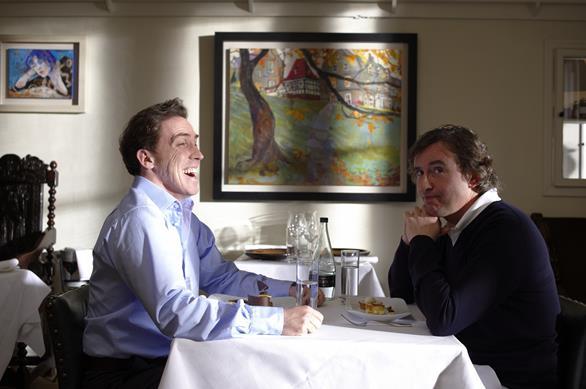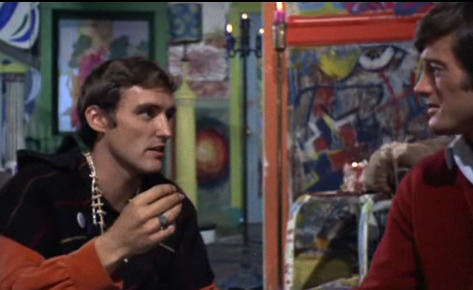

By Mike Wilmington Wilmington@moviecitynews.com
Wilmington on DVDs. The Rest: Larry Crowne, Bellflower, The Trip, Despair, Phaedra

U.S.: Tom Hanks, 2011
In Larry Crowne — a romantic comedy with Tom Hanks and Julia Roberts that should have been a timely, funny show, but isn’t — Hanks plays the title character, an up-from-working-class managerial guy suddenly cut adrift from his life, and forced to try to find a new one. Casting around at a local community college, he takes a class from Roberts, as a discontented teacher who can maybe help Larry, if she can first straighten out her own problems: alcohol and a worthless husband. After a while, Larry looks better and better to her
This is the kind of role Hanks seems perfect for: a hard-working, decent, smart middle-American guy, a likable Ordinary Joe coping with severe, but all-American, problems. It’s a role he actually dreamed up and wrote for himself. Hanks not only directed and produced this movie; he co-wrote the script, with Nia Vardalos, the writer-star of My Big Fat Greek Wedding (which Hanks and wife Rita Wilson produced).
Larry Crowe, is a longtime U. S. Navy veteran (a cook), who got his job at U-Mart — which sounds like a Wal-Mart knockoff, but apparently sells big boxes — right after military service. He has been there ever since, working his way up the U-Mart ladder and he’s become a well-liked manager who wins scads of Best Employee prizes. Suddenly, the door is slammed in his face. Summoned to talk to his bosses (who include Dale Dye, the military advisor on Forrest Gump), Larry is told that his lack of a college degree means that he can’t rise any higher in the organization, and therefore has to be let go. (Larry, the poor schmo, thought he’d been summoned to pick up another Best Employee award.) It’s a pretty ridiculous pretext for a firing at a big box store — surely the company has known about Larry’s school record ever since he arrived — and we suspect that one of his bosses, a jerky-looking one-time worker who was promoted ahead of Larry, may have been politicking. But it doesn’t matter. In a matter of minutes, Larry is gone.
I think he should have sued U-Mart, for unjust firing, for ageism and for promoting softie easily manipulated little supporting-actors ahead of him — or at least he should have thought about it. But affable Larry, instead, enrolls at a local community college, the fictitious East Valley C. C. — and there he meets Julia Roberts as discontented Mercedes Tainot. Beautiful, discontent, borderline alcoholic, she’s the teacher (in public speaking), who may change his life, or at least provide the classy romantic comedy we’re all waiting for.
There are other colorful East Valley students and teachers around too: prickly economics Professor Matsutani (played, in a John Houseman mood, by Star Trek‘s George Takei) and a batch of multi-ethnic fellow students, all young, plus a motor scooter club Larry joins at the behest of the sensationally cute Tali (Gugu Mbatha-Raw), to the consternation of her sometimes friendly, sometimes surly boyfriend Dell Gordo (Wilmer Valderrama). Also there is Larry’s philosophical neighbor Lamar (Cedric the Entertainer) and Lamar’s wife B’Ella (Taraji P. Henson), who always seem to have a yard sale going — though Cedric/Lamar has too much furniture and not enough jokes.
You can tell where this story is going almost as soon as Larry gets fired. But that’s not really the big problem with the movie. Most of us probably want Larry to start putting his life together again, and most of us probably also want him to end up with Julia — though apparently Hanks had qualms about the older guy-younger women romances and had to be coaxed into it. The problem with Larry Crowne is that it just isn’t well-written, or surprising, or funny, or compelling, or moving enough, though God and Gump know, it tries to be. Hanks sometimes nails those qualities with his direction — which is, as you’d expect, affable and easy and generous. The show’s heart is in the right place, but not its mind or its funnybone. It’s nice but dull — and it’s way too obvious.
Larry Crowne, I think, also makes a big narrative blunder, from which it never recovers, in painting Mercy’s husband Dean (Bryan Cranston) as a failed writer and self-pitying disheveled loser, who spends his days surfing for porn on the Internet — and then compounds that mistake by showing us Dean‘s (or the movie’s) idea of pornography, which consists of bikini bathing beauty shots that look as if they came from a Sports Illustrated layout.
To be blunt, having Dean be such a walking stubble-faced horny catastrophe diminishes our sympathy for Mercy. And it deprives Larry of what could have been the slick, classist, nasty antagonist he needs here and just doesn’t have. The movie could have used say, a Jason Bateman-style smug stud (or Cranston in that kind of role), someone who sees Larry as a loser, and is probably cheating on Mercy. A cliche? Maybe. But a cliché that works is better than a weird new innovation (like bikini porn) that doesn’t. And anyway, some of the best romantic comedies, including the oft-cited ones by Preston Sturges, Frank Capra, George Cukor or Howard Hawks, or even Splash and Sleepless in Seattle are often movies that use seeming clichés and then bend and reshape them and make them believable.
There should have been more political/dramatic content in Larry Crowne — since it’s about an ordinary guy getting screwed over by the establishment, and colleges are exactly where, in our lives, we tend to be most political (because there are so many people to be political with). Is it Hanks’ celebrated good guy disposition that makes him, at least in this case, shy away from politics — say, from making the scooter club less of a Mild Bunch and something more community-minded or cause-oriented?

“Bellflower” (Two Discs) (Two and a Half Stars)
U.S.: Evan Glodell, 2011
Bellflower — a Sundance sensation reportedly shot for only $17,000 by first time writer-director-costar-co-editor Evan Glodell — introduces us to a couple of dudes, Woodrow from Wisconsin (first-timer Glodell) and Aiden from the neighborhood (first-timer Tyler Dawson) who live north of L. A. and are obsessed with Mad Max, the coming apocalypse, muscle cars, WMDs and two hotties named Milly and Courtney (Jessie Wiseman and Rebekah Brandes). They all meet up at a barroom cricket-eating contest, which Milly wins. They dally awhile. Then Bellflower pulls us down into screaming ink-black, bloody macho-creepo pathology-drenched hell.
The movie fakes us out. At first it looks as if it’s going to be a funny-sad romantic comedy about twenty-somethings on the fringe, with a lot of bar scenes, four-letter talk and onscreen sex, and then it descends into road warrior-ish, violent, over-the-edge fantasies.
I didn’t like it all that much, or at least as much as a lot of other critics. I found it entertaining but a little light on depth or truth or imagination, and often as obsessed with movie fantasies as its main dudes. Things began to strike me as odd, the moment that Milly, on their first date, said she wanted to be taken to a really grungy, dangerous eatery, and Woodrow suggested one in Texas, and she said sure, and they took off.
In the first part of Bellflower (the name of a street where part of it the picture is set), the main story is a quadrangle, or a pentangle, surrounded by slackerisms. Woodrow loves Milly, who cheats on him and splits with Mike (co-editor Vincent Grashaw), and so the distraught Woodrow takes up with Courtney, who’s the big crush of Aiden.
Aiden meanwhile, seems to love Woodrow as much as his muscle car. He devotes himself to building and fine-tuning that custom baby for his best bud (a black hipmobile with “Medusa” slash-painted on the side) and also to exotic weaponry (including a flamethrower). Since Glodell and his company apparently rebuilt the custom cars and the custom cameras and maybe even the flamethrower, we can see why this movie is so hipped on outlaw technology — especially technology that has a cult movie source, like Mad Max.
The unease we feel though is not always pleasurable. Some of the last act of Bellflower is so bloody-violent and misogynistic that a number of Bellflowers’ partisans (the yey-sayers were the majority of the reviewers) and especially the ones hailing the film as a work of genius (Godard and Linklater crossed with George Miller), have felt compelled to explain or excuse the gory, nutty-seeming climax by saying that it’s all a fantasy (a dream sequence brought on by trauma maybe, like the one in Du Barry was a Lady) and not really happening. Maybe. I hope so.
Anyway, it occurs to me that a movie about a bunch of Valley guys making a low-budget indie movie like Bellflower, and with the writer-director-star maybe using that film as part-revenge for a bad relationship, might have been really interesting. Maybe that would have been the masterpiece. But I’m always glad when somebody makes an American indie breakthrough — or a foreign indie breakthrough for that matter. More power to Glodell and his gang. I’d be astonished if this movie doesn’t get him bigger chances and higher budgets, and he deserves them.
Of course it would be hard not to muster more of a budget than $17,000. Or to get more production value out of it than they do here. This movie’s credits list fourteen producers, four camera people (cinematographer Hodge, a camera operator, an assistant camera and a steadi-cam operator), a Foley artist, six mixers, a sound effects editor, a boom operator and a digital visual effects artist. All that, and more, and a cast, and the fixes on the camera and car, and maybe a little catering from Fatburger, for $17,000? Maybe they just meant the initial pre-post-production budget. Or the pre-production budget. Maybe Glodell is a genius. At any rate, he’s certainly a guy with a big future, maybe in chop-shops and accounting as well as in movies.
















